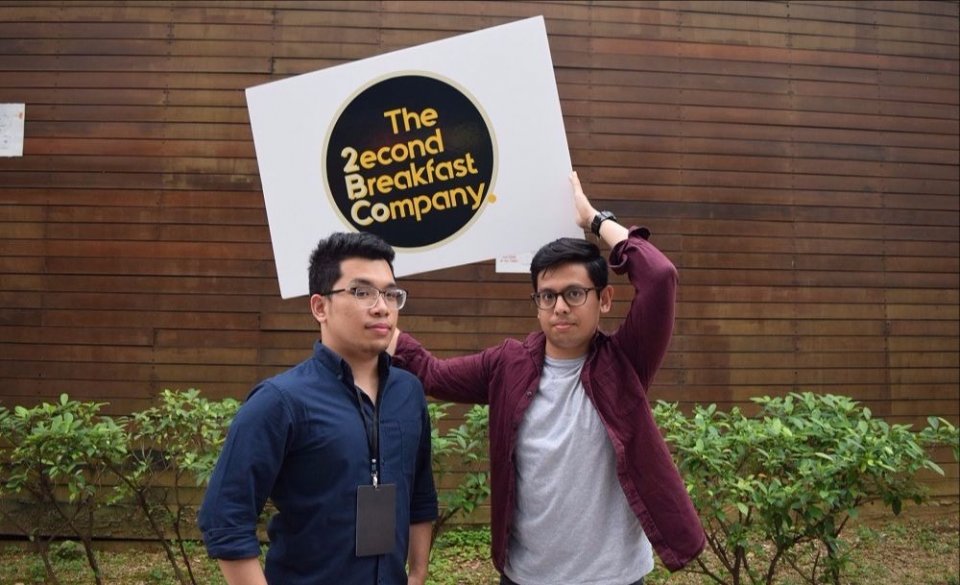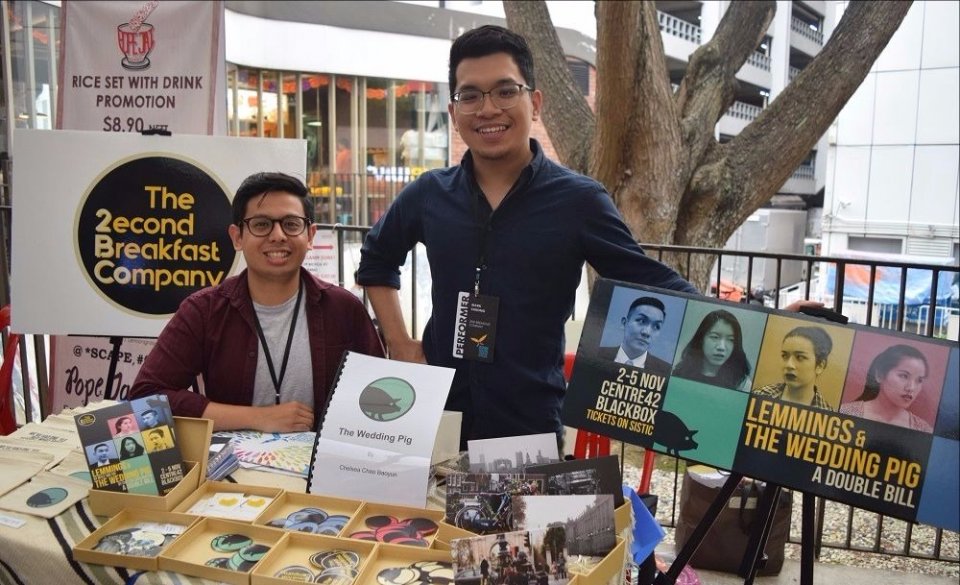Most great ventures don’t typically start with the death of another. The Second Breakfast Company, however, is one such morbid example.
In less dramatic terms, the year-old theater company was founded when four individuals—Mark Cheong, Adeeb Fazah, Kristine Ng and Denise Dolendo—first came together during the restructuring of their community theater company, Yellow Chair Productions. The artistic director of the company based out of Tampines Central community center had called upon them for help, before leaving to pursue a Masters in the UK.
Cheong, 25, recalls sheepishly how that quickly fell through. “We came together in this restructuring and we said, okay, let’s make this team to continue this thing of putting up shows and all that—and we kind of ran away with it.”
Today, Yellow Chair is on an indefinite hiatus—but not for nothing. The four of them, all fresh out of university, have made the Second Breakfast Company (or 2BCo for short) their main priority, on top of their full-time jobs. Their goal: to create a legitimate youth voice through local theater.
From across a table at Makisan in Orchard Cineleisure, co-artistic directors Fazah and Cheong dip their sushi rolls in soy sauce, and take turns to chew thoughtfully as they ponder our questions. They’re wearing shirts with “Asian Youth Theatre Festival” (AYTF) emblazoned on them, having just finished staging a run at the annual festival at *Scape.
(Later they will ask to change out of the shirts before taking any photographs, because no self-respecting thespian wants to be seen in garish clothing, no matter the level of dedication to their work.)

The dynamic duo recently graduated from the Wee Kim Wee School of Communication and Information
When asked what sets them apart from other youth theater companies, Fazah pointed to their method of using open calls on social media to pool young talent.
In their last open call for original scripts, they received a whopping 40 entries—and were so impressed they decided to stage two of them as a double bill. The upcoming double bill, which will run from Nov 2-5, comprises Lemmings by Yale-NUS undergraduate Myle Yan Tay, and The Wedding Pig, a debut script from recent Yale-NUS graduate Chelsea Cheo. The combined five-strong cast is made up of LASALLE acting majors, aged between 21 and 27.
The company’s main focus, says Cheong, is to give youth a platform—to perform, do work and explore the theater scene here. That means working with inexperienced stagehands, up-and-coming actors and even lighting and sound designers. Cheong himself, who by day is a full-time marketing associate, does the sound design for the shows.
“There’s a lot of stuff that’s going on at the higher level, where you have established directors, designers and actors who are able to do their work—but there’s no stepping stone in that same space for youth to say ‘hey, is there anything I can do for you?’, he explained. “We feel we can be that bridge for them.”
Beyond that, the pair is confident that 2BCo are more than just the tired tagline “for youth, by youth”. The way they program their content is strategic too. The team focuses on three different types of productions—digging up and rejuvenating works from the canon of Singapore theater; adapting international works for young Singaporean audiences; and producing original work from fledgling local playwrights.
That last category of work ties neatly back into the company’s goal of creating a place for youth voices to be heard.
Sadly, even that is a challenge sometimes. While 2BCo had successfully received grants from the National Arts Council for their sold-out debut production of Leow Puay Tin’s Family last year, they were turned down for this year’s double bill.
“The official reason given was, of course, that funding is always scarce, and ‘competition is tough’,” shared Fazah. “But we have our own suspicions and one of them is that Lemmings deals with a sensitive issue, especially at the moment when religion is quite a topic lah.”
In addition, receiving a rating from the Info-communications Media Development of Authority (IMDA) to stage their show publicly is “taking forever”—making it difficult for the company to sell tickets to students who aren’t at least 16 or 18 years of age.
“We haven’t been able to push ticket sales to [students], which is very sad because we are targeting schools,” Fazah added. Their current solution has been to crowdfund on Indiegogo, while seeking out community tours that might pay them for putting on shows. Participating in events like the AYTF also help increase brand awareness.

Fazah and Cheong at 2BCo’s booth at the Asian Youth Theatre Festival
Even with very adult problems of censorship, as a group of 25-year-olds, it’s easy to come across as just little kids playing in the adult pool. Fazah acknowledges that oftentimes young people come together to form collectives, to put on shows and create content; but end up disbanding when “life happens”.
But don’t expect 2BCo to follow in the footsteps of their fallen brethren. For one, having a long-term approach helps as a driving force in juggling full-time commitments—the two shared that plans for next year’s productions are already in the works. Of the line-up, they are especially excited about another original staging from a 19-year-old writer Fazah called “gifted”.
“When he first found out we were going to stage it he was really excited,” he said. “And we were really excited, because here is someone who’s so young, and has a clear voice, but hasn’t been put on a level playing field as people who have equally strong voices.”
“And that’s the thing—we feel like, ‘we’re only how old, who are we; what can we accomplish?’ But when we come together and we tell a good story, we know that the work we do can compare to and be on a level playing field with the big players; with the grown-ups.”
Read on for the pair’s take on manoeuvring the adult world.
Do you find yourself going after the same pie as the big boys?
MC: It’s a very difficult thing to really say. If you consider the economics of it—if I had $50 to spend, would I spend it on a show by Wild Rice, which may not even be $50; or should I spend it on 2BCo, which is about $25 or so? If this pie is someone’s budget, then maybe yes.
But in Singapore where the number of people who identify themselves as theater-goers isn’t as big as it could be, it’s not so much that you’re fighting for a slice of that pie, but you’re also thinking about how can we make this pie bigger—not just for ourselves, but for everyone else as well. Which is why we say ‘for youth, by youth’; because if young people are making and acting in shows, and they invite their friends over, it also helps in our effort to grow this pie, to get more people involved and interested in understanding what theater is, and spending their time with us.
Has there been support from veterans in the scene?
AF: Yes. Interestingly, we had a few veterans who came to see our show last year and very graciously they offered to meet up with us after the show to just talk about it, get to know us. Some of the members of the original production of Family came to watch—Lim Yu-Beng and Tay Tong, who was the producer. And it’s been great, because they are very constructive about it; they’re not going to bluff and say ‘good job’, et cetera. But they will also be supportive, so like ‘ok if you guys need feedback and further stuff we’re always here’.
MC: I think it’s in everyone’s best interest that they see us grow and invest their time and energy into us, so that—not as growing competition or anything—but in a more altruistic way, we want more voices in the scene, we want more people to be talking about things. We want the industry to grow, because people are not going to be doing this forever, and there has to be some kind of renewal at the end of the day.
What about fellow young theater companies? Do you compete?
AF: I think everyone who is already doing theatre work, they know how hard it is to get by so there’s a lot of good will that goes around. There are a lot of people who will be nice to each other, lIke ‘oh you support our show we support yours’. So even if it’s as simple as we know someone’s already doing a show here, then we won’t do it at the same time, we do it after, so that we don’t really have to go head to head.
MC: It’s generally healthy competition. And generally people want to see each other do well. It’s not that you go to a show and you’re like ‘oh I hope it sucks’.
Was getting turned down by NAC something you anticipated, having knowingly pitched the script?
AF: Actually it should have been anticipated but we really didn’t see it. Because for us the play touches on a sensitive topic, but if we don’t discuss it then it’s a problem. And if we put it on the stage we can hold an open discussion about it—that’s one of the reasons why theater exists anyway.
MC: Censorship has been something that’s always haunted theater-makers. But I feel that resistance in a way also challenges us to be better, and to find new ways to make this work. And it’s only in this resistance can we can kind of know that, okay, if there is this resistance, that’s because we’re talking about something that should be talked about. Maybe that resistance is a sign that we’re doing something right; rather than just coasting along with shows that don’t mean anything.
Is the company profitable enough to ever be a full-time thing?
AF: It’s definitely on the table; I think it’s just a matter of how much we will do now to get there. The way we operate right now is per project. This year has been a bit challenging, because we didn’t get the funding from NAC, and that put us in a position where even if we sell out the show, it’s not going to be profitable. So right now there is a scramble for us to find different creative ways of still raising the money, to at least break even. But it’s not a new challenge—you go to any theater company and they’ll tell you that raising funds has always been difficult. So we just have to take it in our stride; the show will go on, as it is.
Lemmings and The Wedding Pig: A Double Bill runs from Nov 2-5 at Centre 42. Tickets are still available here and you can support their crowdfunding campaign here.





